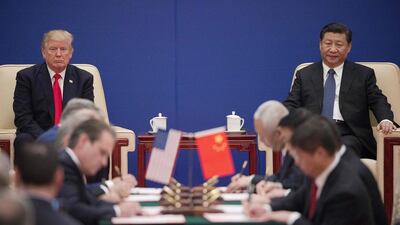Investment between the US and China tumbled to a nine-year low in the first half of 2020, hit by bilateral tensions that could see more Chinese companies come under pressure to divest US operations, according to a new report.
Investment, both direct investment by companies and venture capital flows, between the two countries fell 16.2 per cent to $10.9 billion (Dh40bn) in January-June from the same period a year earlier - also hurt by the coronavirus pandemic, according to figures from consultancy Rhodium Group and a non-government organisation National Committee on US-China Relations.
That's a far cry from half-yearly totals of nearly $40bn seen in 2016 and 2017.
Flows are unlikely to recover this year, regardless of the outcome of the US presidential election, the report said, as "systemic concerns driving caution on Chinese investment in high technology, critical infrastructure and personal assets will not subside."
Citing national security risks posed by Chinese technology firms, US President Donald Trump's administration has sharply expanded actions to hobble Chinese companies.
This has included putting telecoms giant Huawei on its trade blacklist, threatening similar action for Semiconductor Manufacturing International and ordering TikTok owner ByteDance to divest the short-form video app.
ByteDance is currently seeking approval for a deal with Oracle that is structured as a partnership rather than an outright sale.
"At a time of rising discomfort with US-China technology integration numerous other companies - both Chinese firms operating in the US and the US firms with a presence in China - may be forced to divest," the report said.
It added that the US treatment of ByteDance and the broader shift away from US-China technology integration may lead to policies which make it more difficult for US tech firms to operate in China.
Investment by the US firms in China in the first half tumbled 31 per cent to $4.1bn, while investment by Chinese companies in the US rose 38 per cent to $4.7bn, the report said. That was mostly due to one deal - a Tencent Music-led consortium’s purchase of a minority stake in Universal Music group for $3.4bn.

